
Here's my Top 10 links from around the Internet at 10:00 am today in association with NZ Mint.
Bernard will be back with his version tomorrow.
As always, we welcome your additions in the comments below or via email to bernard.hickey@interest.co.nz.
See all previous Top 10s here.

1. Same parent
Goodness. The US Tea Party movement and Occupy Wall Street have the same origins - a speechwriter for 1960's failed presidential candidate, Barry Goldwater. Goldwater was a big fan.
Ron Paul also seems to have a soft spot for the Occupy movement too.
Explaining how all this connects back to one Karl Hess is Maureen Tkacik at Reuters.
In reality, of course, no political movement springs “from nothing.” Indeed, both of them have roots in the same man. Fifty-five years earlier that fall, the Tea Party movement’s direct ancestors met in Indianapolis to launch their first bid to rally citizens against the “dedicated, conscious agent of the Communist conspiracy” occupying the White House, Dwight Eisenhower. But when their beloved anti-communist Barry Goldwater was buried in the 1964 presidential election, the Republican Party moved swiftly to officially renounce the “radical organizations” that had sullied its public image. Then the most radical of the right-wing radicals, Goldwater’s beloved speechwriter Karl Hess, moved into a houseboat, renounced politics altogether and dedicated the rest of his life to peacefully protesting the concentration of political and economic power in the hands of the new aristocracy he dubbed “the one percent.”
You read that right: The first guy to call the 99 percent to arms was the author of a speech that claimed: “Extremism in the defense of liberty is no vice.” Goldwater had fondly referred to Hess as “my Shakespeare.”
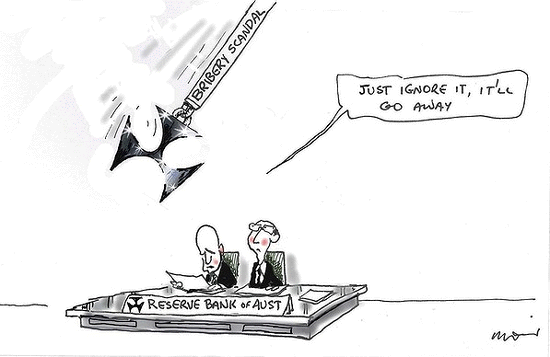
2. Past their use-by date
Could the ATM be going the way of the cheque? Eric Johnston at the Sydney Morning Herald has noted the trend that online banking is making ATMs redundant.
Once viewed as the wrecking ball for bank branches, it now seems ATMs are struggling to keep pace with newer forms of online banking. With the increased use of eftpos as well as cash-back facilities from supermarkets and the sharp take-up of mobile banking apps, the number of ATMs is slowly shrinking. Just a few years ago, ATMs had the promise of doing everything, from spitting out foreign currency to booking movie tickets, but few actually do this now.
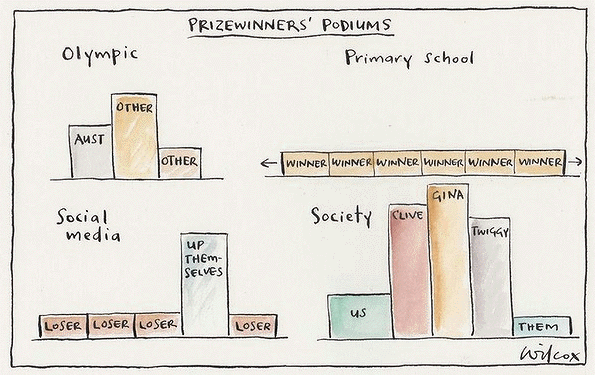
3. A phantom problem?
Floyd Norris has been scratching his head at the NY Times. Not only has China been selling US Treasuries, the US Fed has not been buying in response, a finding counter-intuative to the popular/media opinion. And the amount the US Government owes seems to be about US$10 trillion, and not the $US16 trillion usually reported. These are big discrepancies. His analysis is here »
A year ago, when the United States government was borrowing huge amounts of money and paying very low interest rates to do it, critics scoffed that a lot of Treasury bonds were being purchased by China, and even more of them were ending up in the hands of the Federal Reserve, the American central bank.
What would happen if China decided to start selling Treasury bonds? And what would happen if the Fed’s appetite for government bonds were to be quenched?
Not much, it appears.
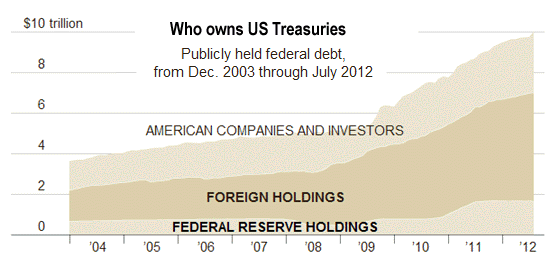
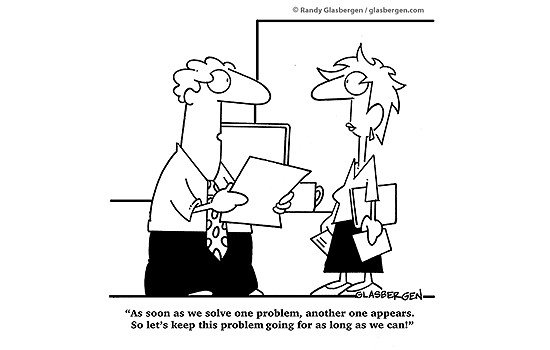
4. A poison pill strategy
The co-ceos of Deutche Bank are beavering away integrating their behemoth bank in such a way that regulators won't be able to break it up. Essentially, their goal is to get a structure too-big-to-regulate. Spiegel Online has the story:
EU Commissioner Michel Barnier has asked experts to examine the possibility of splitting up major European banks to avoid future bailouts at taxpayers' expense. But even less radical intervention in the banking sector could have drastic consequences for the industry, and its powerful lobby is resisting any such change.
... to the [joint CEOs], another message was even more important than the avowal of their close partnership, namely that Deutsche Bank, too, is inseparable.
Jain and Fitschen made it clear that they intend to transform Deutsche Bank into the world's leading universal bank. When responding to the question of what would happen to their strategy if politicians were serious about their plans to split up large banks, the two top executives feigned innocence. "We have no plan B," said Fitschen, noting that they had not received any indications from Brussels or Berlin that there was any need for discussion of any such eventualities.
Apparently they haven't been listening.
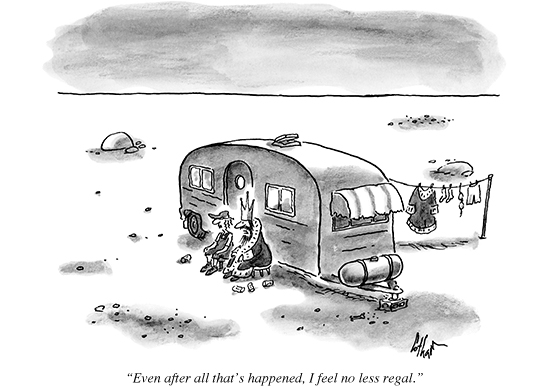
5. The igNobels
These annual awards are now out, and in case you missed them, the BBC has a good summary of scientific triviality - proof indeed that academic study interests will always follow the grant money. But there is one award I though was especially well deserved:
Literature Prize: The US Government General Accountability Office for issuing a report about reports about reports that recommends the preparation of a report about the report about reports about reports.
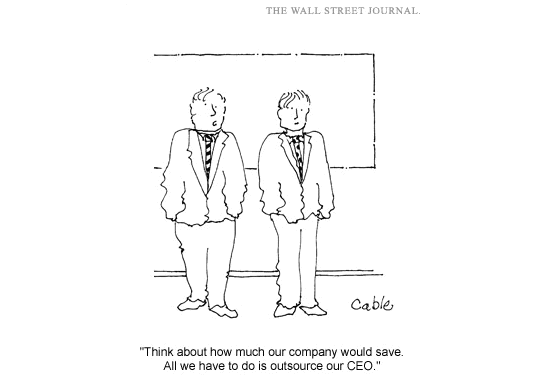
6. "The tradeable sector can't save us"
Here's one orthodox economist - Michael Spence, a Nobel laureate - who is not seeing much positive in the tea leaves he is reading:
The non-tradable side of any advanced economy is large (roughly two-thirds of total activity). For this large sector, there is no substitute for domestic demand. The tradable side could make up some of the deficit, but it is not large enough to compensate fully. In principle, governments could bridge the gap, but high (and rising) debt constrains their capacity to do so (though how constrained is a matter of heated debate).
The bottom line is that deleveraging will ensure that growth will be modest at best in the short and medium term. If Europe deteriorates, or there is gridlock in dealing with America’s “fiscal cliff” at the beginning of 2013 (when tax cuts expire and automatic spending cuts kick in), a major downturn will become far more likely.
The second factor underlying today’s problems relates to investment. Longer-term growth requires investment by individuals (in education and skills), governments, and the private sector. Shortfalls in investment eventually diminish growth and employment opportunities. The hard truth is that the flip side of the consumption-led growth model that prevailed prior to the crisis has been deficient investment, particularly on the public-sector side.
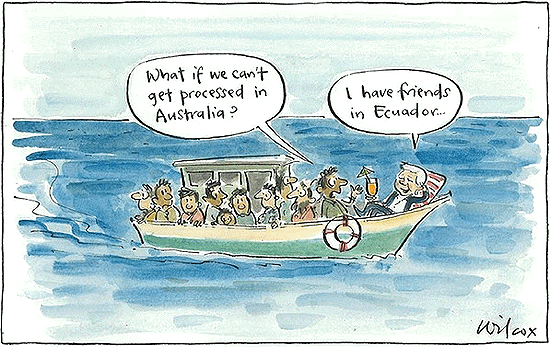
7. No confidence
Former central bankers from both the US and Europe have been talking about how they think current central bankers are performing. "I was better" seems to be the theme. Here is Paul Volker from the US, an ex Fed chairman:
Volcker, who has been a pivotal force in post-crisis regulation – as well as the architect behind the “Volcker Rule” that bares his name – addressed ... [a] ... Scotland conference about how to revive the economic fortunes of the western world. “Monetary policy is about as easy as it can get,” said Mr Volcker, who built a reputation for quelling inflation through the unpopular decision of raising interest rates during his tenure at the US central bank.
“Another round of QE is understandable – but it will fail to fix the problem. There is so much liquidity in the market that adding more is not going to change the economy.”
and here is Juergen Stark, ex- the Bundesbank in Germany:
The European Central Bank is in "panic" over the eurozone crisis and acting outside its mandate with its new bond-buying plans, the bank's former chief economist said in comments published Saturday.
Mr Stark quit in late 2011, following in the footsteps of former Bundesbank head Axel Weber, who stepped down earlier in the year from Germany's central bank because of unease about the ECB's policies.
"The break came in 2010. Until then everything went well," Juergen Stark, the German who resigned from the ECB in late 2011 after criticising its earlier round of buying up of sovereign debt, told Austrian daily Die Presse in an interview.
"Then the ECB began to take on a new role, to fall into panic. It gave in to outside pressure ... pressure from outside Europe."
Mr Stark said the ECB's new plan to buy up unlimited amounts of eurozone states' bonds, announced on September 6, on the secondary market to bring down their borrowing rates was misguided.
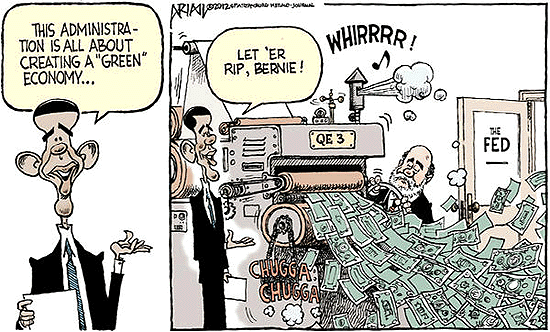
8. 'It's all about the stories we relate to'
Now a behavioural economist - Robert Shiller - who thinks we are missing a vital component in how we assess the way we will get out of the world economic funk: what you think. Until the head-space of enough people turns positive, the economy of nations and the world will languish, he says.
When one considers the evidence about external economic shocks over the past year or two, what emerges are stories whose precise significance is unknowable. We only know that most of us have heard them many times.
This brings us to the importance of stories – and very far from the kind of statistical analysis exemplified by Stock and Watson. Psychologists have stressed that there is a narrative basis to human thinking: people remember – and are motivated by – stories, particularly human-interest stories about real people. Popular stories tend to take on moral dimensions, leading people to imagine that bad outcomes reflect some kind of loss of moral resolve.
The European crisis began with a Greek meltdown story, and it appears that the entire global economy is threatened by events in a country of only 11 million people. But the economic importance of stories bears no close relation to their monetary value (which can be measured only after the fact, if at all). It depends, instead, on their story value.
One might object that most people outside of Europe surely were not following the European crisis closely, and the least informed have not even heard of it. But opinion leaders, and friends and relatives of the least informed in each country, were following it, and their influence can create an atmosphere that makes everyone less willing to spend.
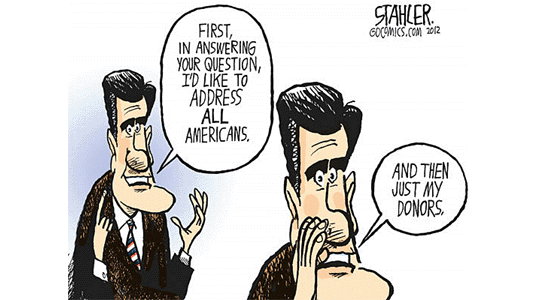
9. AU = 45%, US = 47%, NZ = 65% ?
According to Mitt Romney (who himself reportedly pays just 14% in tax), 47% of Americans pay no income tax at all. The AFR has done the numbers in Australia, and that shows 45% of Australians pay no tax.
So what are the numbers for NZ?
Well, obviously everyone is paying something - GST, petrol tax, rates (or rent that fund rates) - but if we just look at the NZ numbers for income tax it is not so clear.
Treasury says that based on their March 2012 analysis of the HES (Household Economic Survey) only 8% of Kiwis have no taxable income at all, but that 667,000 (or 20% of us) pay less than $300 per year in tax. However the NZ numbers get murkier because these numbers are about gross income tax paid. They do include the income tax 'paid' on NZ Super and don't account for the working-for-families and other tax credits. Not sure this is entirely correct, but if we assumed most people reporting taxable incomes of $40,000 or less get some income/rent/welfare assistance and that state benefit is worth at least $88 per week on average (and remembering NZ Super is worth $400.07/week gross, $348.92 net), then there may be as many as 65% of New Zealanders "who effectively pay no income tax".
Those Treasury numbers also show those earning above $70,000 per year pay 54% of all income tax - but they are just 15% of the working age population.

10. Homer votes
Who will Homer Simpson vote for in 2012? Remember, The Simpsons are brought to you by Fox Television (aka Rupert M). However, maybe the scriptwriters were a little subversive here after getting the memo.
25 Comments
#9 Mock shock horror! the stats don't lie! Based on a balanced budget the average NZer pays no tax! The benefits they get from the state directly and indirectly offset the full amount of tax they pay! I just love the rich in America, they simply cannot comprehend that in order to stand on the bodies of the poor americans they must at least feed them otherwise they'll be just be knee deep in rotting meat
9. The Big Kahuna solves all this with a comprehensive capital tax, a flat tax rate on income, a lower rate of GST and a GMI - giving the added benefit of a smaller tax department and no WINZ. Same tax and welfare rules apply whether you are 18 or 80.
Lower GST? I didn't think that was a part of it?
@ #9
Can we please stop perpetuating the Republican talking point that 50% of Americans are on government handouts”? Almost half of those ‘50%’ are retirees! The number is only going to increase in the next 10 years as the baby boomers retire. Of the other half of those 50% most of them are the working poor who have too many dependents to qualify to pay federal income tax. Of the 50% people keep quoting as “freeloaders” only 5% qualify as those on government handouts and most of them are on unemployment that they already paid into via unemployment insurance. With the US economy hovering around 18% real unemployment, that means there are only 1.5-3 million freeloaders out there or 0.3% of the population. Not exactly a ton of freeloaders running around out there.
Not to mention that the reason Obama is likely to get re-elected is because 47% of Americans are on food stamps...so will vote to keep the handouits coming....
ho hum....
The delusion of the US [christian] right is so farcical its funny IMHO....why not report the um lies, mis-truths and fabrications? its worth the laugh.
;]
regards
#9. It's time to get rid of income tax at all. It must be a small part of the total government income now. And as ncome tax goes, also it's doppelganger 'working for families'. With slightly increased consumption taxes, (GST) which is very fair to low income people, income tax could be disappeared with barely a ripple.
Nope - income tax is still the biggest contributor to the overall central government revenue;
Pie chart here;
http://www.treasury.govt.nz/government/longterm/schoolschallenge/faqs
You tricked us into reading stuff with all your talk about pies, the link has nothing at all to do with pies, there are no pies at all, it does not even mention pies.
by clicking on the link without pies we do get to read stuff like this:
As with any individual or household, a government has a number of revenue sources (e.g. taxes, levies) with which to pay a range of expenses (e.g. social benefits, wages). Typically, if expenses exceed revenue at any time, it is able to borrow to cover the shortfall. As long as there is expected to be sufficient revenue to repay this debt in the future, the fiscal position is “sustainable” – i.e. current policy settings can continue in the long term without the government running out of money.
However, if a government's expenses (and therefore debt) are expected to grow at a rate that is significantly faster than its income over the long term, eventually it will be unable to meet its financial obligations.
So the reserve bank likes to think that governments are like households- and we pay these people actual real money.
This is so far removed from reality that it is a little troubling to say the least.
Note its written for school kids - indoctrination at its worst - train 'em up as lambs to the slaughter, eh?
Fair point. Income tax $23 billion but thats gross.. But what is the 'net' income tax. Lots less. Given even the oldies and the beneficieries pay tax on their government provided incomes.
And there are the 'Working for Families' people. There people pay Income Tax on their wage. But get subsidy money back. We should as least deduct the total WFF $ from $23 bil. And so on.
Next pie down is instructive:
$23b (tax on income) - $22b (super and social welfare spend) = $1b.
In other words (generally speaking) - health, education and the rest are largely reliant on spending, smoking and suv-ing. Oh, and borrowing, of course!
So the OAPs double, already the PAYE carries the bulk of the load so there will be less PAYEs...and the OAP spend less....so GST take etc will also all decline....while the demands/costs of the OAPs looks to double.
I thought JK was financial whizz kid....certianly I wonder when I look at this yet he says no to raising the pension age....mind you Im not so sure thats a big thing, raising taxes could cover that instead and it would be more progressive.
regards
IMHO - only a major overhaul of what is taxed has any chance. Taxing capital to my mind is a sort of a tax on the past - i.e. a tax on that which has already been accumulated and paid for. If you follow the 'growth is gone' edict - well, it's perhaps the framework of the future?
Trouble is we face capital being wiped out....
For instance if a property is worth 10million based on a 5% return....and there are huge amounts of 1s and 0s floating about so they buy and bid the price to 20million the return is 2.5%, not good.
Fold in the effects of peak oil and those returns drop could go under 1%....really that property is worth at most 2million....in effect 18million disappears...
I think we will see a land tax for one...it has to be a tax on hard assets that cannot disappear. So simply say a tax of $1000 per year per 500m2 of land you own....if your income drops unlike GST or PAYE the Govn's takes doesnt drop you still owe $1000+ per year. Now the Q becomes how long can the Govn's income and councils rates survive [lots of] ppl going bankrupt.
regards
There is a solution - it's called reverse equity mortgaging - sure alot of folks sitting on accumulated untaxed gains won't like it but ...
a land tax would tax some of the unearned gains that the owner of the land can capitalise. eg water on the Canterbury Plains- this water is going to make some land worth a whole lot more. a land tax would capture some of that unearned gain. - The land owner did not create the water, or do much at all - he just gets the water.- good for him
Income tax. aaaagh. I always liked the story of some European farmers who paid no income tax. So managed their considerable businesses with simply a chequebook in the back pocket. No annual accounts. Just like we do here with out private lives and houses etc.
The concept of profit and loss was irrevelant. Just like at home, if one was considering putting a room on the house you can work that out without annual accounts. It depends on likely future cashflow, cash in hand and whether you really wanted that room or not. Same for these farmers buying a tractor.
Under that no-income-tax system depreciation was irrevelant. Just like at home if we buy a big TV, we don't spend the next several years determining it's current value.
I always think it quite pointless sitting with the accountant discussing what the depreciation should be, (or write off) of a computer or printer say, that I can only dimly remember buying or owning.
To manage well you do need to understand what your expenditure streams are (acknowledging Amanda's advice ), and income streams, but the annual calculation of 'income' is unneccessary.
I would think the money we spend on accounting is often not about business information. That's entirely absent from most accounting info I see. Mostly 'accounts' that I see are to determine taxation, and provide no real management information at all.
Tax and private vs govt is a deckchair argument.
One otf the reasons that you're wasting your respective idological times on it, is that you are part of a society suffering from mass delusion.
No6 tells us why. A Nobel laureate in economics, no less. What a f...wit.
No cognisance that 'growth' is exponential. No cognisance of the physical limits to it. So high up in the genre, but so blind. And on the words of such high priests, the vast majority hang.
Looks like our spooks breached the rules of trick or treat;
http://www.voxy.co.nz/politics/prime-minister-requests-inquiry/5/135602
Dotcom is a legend.
nice........
regards
Kathryn Ryan
"are you worried about this generation of under foties (given the doubling of house prices in the last 7 years etc). Will they be able to save?
Bollard:
"well no, because they're richer, better qualified and earning more"
K. R
"are you sure with people queing outside to bid on a home?"
B
"we'll I mentioned before we're having a building program...."
Most of heard of tipping points the sensitivty of a system in the region close to a bifurcation point eg Robert May 2008 (in ecology for bankers)
Catastrophic changes in the overall state of
a system can ultimately derive from how it is
organized — from feedback mechanisms within
it, and from linkages that are latent and often
unrecognized. The change may be initiated by
some obvious external event, such as a war, but
is more usually triggered by a seemingly minor
happenstance or even an unsubstantial rumour.
Once set in motion, however, such changes can
become explosive and afterwards will typically
exhibit some form of hysteresis, such that recovery
is much slower than the collapse. In extreme
cases, the changes may be irreversible.
What a lot may not have heard of is the sensitivity of a trading system to a tipple point,That examples still persist in the system is troublesome,
#9 - When comparing NZ tax to the US, consider the following:
A) NZ GST is much higher than US sales tax rate of between 0% and 9% depending on which state one lives. The GST (or sales tax) disproportionately affects those with lower incomes.
B) US has a 15% capital gains tax. Someone like Mit Romney pays a 14% income tax rate because his income comes from capital gains. In NZ, he would pay 0%.
Based on the above to points, the rich in NZ seem to have it pretty well from a tax perspective...
http://www.pundit.co.nz/content/tax-burdens-some-facts-for-a-change
"The wealthiest 10% of New Zealand families control roughly 50-60% of the wealth"
I'm perfectly happy for these people to pay between 30% and 50% of the tax bill. It doesn't even seem so wrong that they might be asked to pay more.
Or should the bottom 50% pay the most???
Surely no-one is suggesting that we divide the tax requirement up equally and get everyone to pay "their share"?
A lowly paid cleaner (or a retiree, etc) paying the same absolute income tax as a wealthy merchant banker... yeh, right.
Those Treasury numbers also show those earning above $70,000 per year pay 54% of all income tax - but they are just 15% of the working age population.
Yep. What's the problem?

We welcome your comments below. If you are not already registered, please register to comment
Remember we welcome robust, respectful and insightful debate. We don't welcome abusive or defamatory comments and will de-register those repeatedly making such comments. Our current comment policy is here.